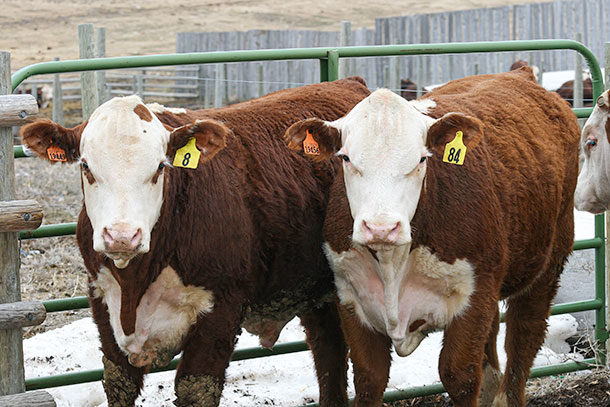There is always a buzz during bull sale season about the body condition of bulls. Seedstock producers have done a tremendous job over the past decade at improving their development strategies to ensure bulls are not overconditioned. An abundance of research has helped make cattlemen aware of the issues in semen production that occur from overconditioning young bulls.
Research has established an understanding that overconditioned bulls will deposit fat in their scrotal neck, which impairs the thermoregulation of the testicles. This lack of temperature regulation typically has a negative impact on semen quality. We also know that in general, cattle fatten from top to bottom, front to back. This makes the scrotum one of the last places a bull deposits fat in his conditioning processes. Thus, the impact of overconditioning would typically be seen at the end of the developmental phase.
In the past decade, veterinarians and semen laboratories started to notice that there were issues with semen production early in the bull development process. This led to additional research to determine what could be going on.
At the beginning of the development of young bulls, the introduction of diets containing readily fermentable carbohydrates can cause subacute or acute ruminal acidosis. Ruminal acidosis is a metabolic disease in cattle that is associated with feeding rapidly fermentable carbohydrates with inadequate fiber or the abrupt transitioning of cattle onto a high-concentrate diet. When cattle experience acidosis, not only do they have nutritional and digestive issues, but their body induces an immune response, which is typically accompanied by an increase in cortisol (stress hormone) and an alteration of other hormone levels and production.
A study conducted in 2016 found that in comparison to bulls without acidosis, bulls that experienced subacute acidosis had reduced semen quality for up to 88 days. This can likely be attributed to the difference in circulating hormones that were noted. Serum concentrations of hormones that regulate the production of sperm cells were impacted by acidosis for up to 90 days following acidosis (in comparison to bulls in the control group that didn’t experience acidosis. In this study, bulls that experienced acidosis went from having 90% normal sperm cells to 70%. This decrease would impact their breeding capacity.
More research is needed to further explore the impacts acidosis can have on semen quality. Keeping in mind that the production of healthy semen is a cascade of linked events that occur over 61 days in bulls, seedstock producers should be conscious of the potential for it to occur throughout the development process, at each dietary transition. This consideration will ensure that the bulls they are marketing have the greatest opportunity to pass their pre-sale breeding soundness exam and are ready to go to work.
References omitted but are available upon request by sending an email to an editor.












